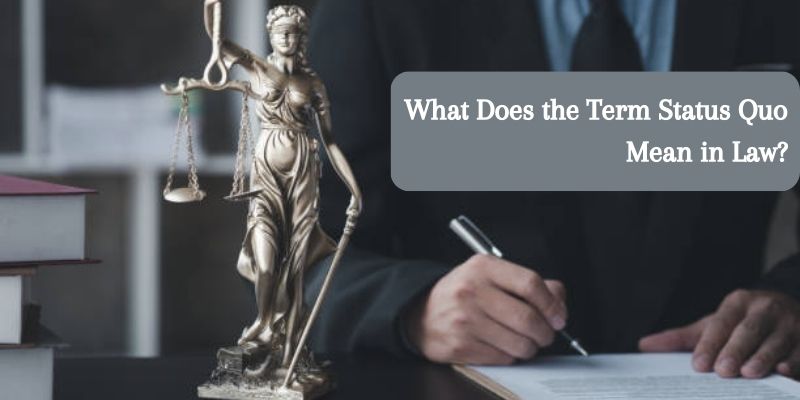What Does the Term Status Quo Mean in Law?
According to the veteran lawyers, the term "status quo" stands for the existing state of affairs or the current condition of a case or situation. It is often used to determine the baseline or starting point for legal analysis or decision-making. The status quo principle is particularly relevant in areas such as contract law, where the courts aim to preserve the rights and obligations established by the parties. Maintaining the status quo in legal disputes can temporarily prevent irreparable harm or ensure fairness until a final resolution is reached. It serves as a guiding principle to maintain stability and avoid disruptive changes while legal proceedings are ongoing.

Also Read: Finding the Right Banking Lawyer: Tips and Considerations
The property lawyers in Kolkata believe that the term has great significance in the legal handling of a case. The court of law always refers to existing affairs or the existing condition of a situation when it starts proceedings in it. Here are some critical questions that can help you to enrich your knowledge about the term ‘status quo’:
What is the status quo in a court case?
In a court case, the term "status quo" stands for the current state of affairs or the current situation before any legal dispute shows its impact. It signifies the usual conditions, rights, and responsibilities of the parties involved in the property. When defining the status quo, the court inspects the factual and legal positions of the parties at the time the dispute emerged. The status quo often serves as a reference point for the court's decisions or orders, aiming to maintain stability or restore the parties to their previous positions until a final resolution is reached. Here, the role of a property lawyer in Kolkata becomes very significant.
What is an example of the status quo?
When two neighbors have an argument or dispute over a property boundary, the status quo, in this case, would be the existing physical boundary and the way both parties used the land before the dispute came up. The court may seek to maintain the status quo by issuing a command, barring any changes or adjustments to the property until a final decision is made. This ensures neither party gains partial benefits when the legal proceedings move ahead or unfold.
What is an example of a status quo in law?
An instance of a ‘status quo’ in law is when a court grants a provisional preventive order in an internal violence case. The status quo, in this example, would be to preserve or uphold the current living arrangements and avert any connection or harassment between the parties involved until a hearing or trial can take place.
What is the difference between the status quo and stay order?
The difference between a status quo and a stay order lies in their nature and scope. Status quo refers to the existing state of affairs or the current condition of a situation. It can temporarily maintain stability and prevent any changes until a final resolution is reached. On the other hand, a stay order is a formal directive issued by a court to suspend or halt proceedings in a case.
You May Also Like to Read: An Overview of Family Law Mediation: Process and Benefits
If you have any doubts or queries about the status quo meaning in law, you should contact the most learned property lawyer in Kolkata. You should collaborate with the experts individually or by speaking to the experts at a top law firm.
Full Audio: Listen Here
